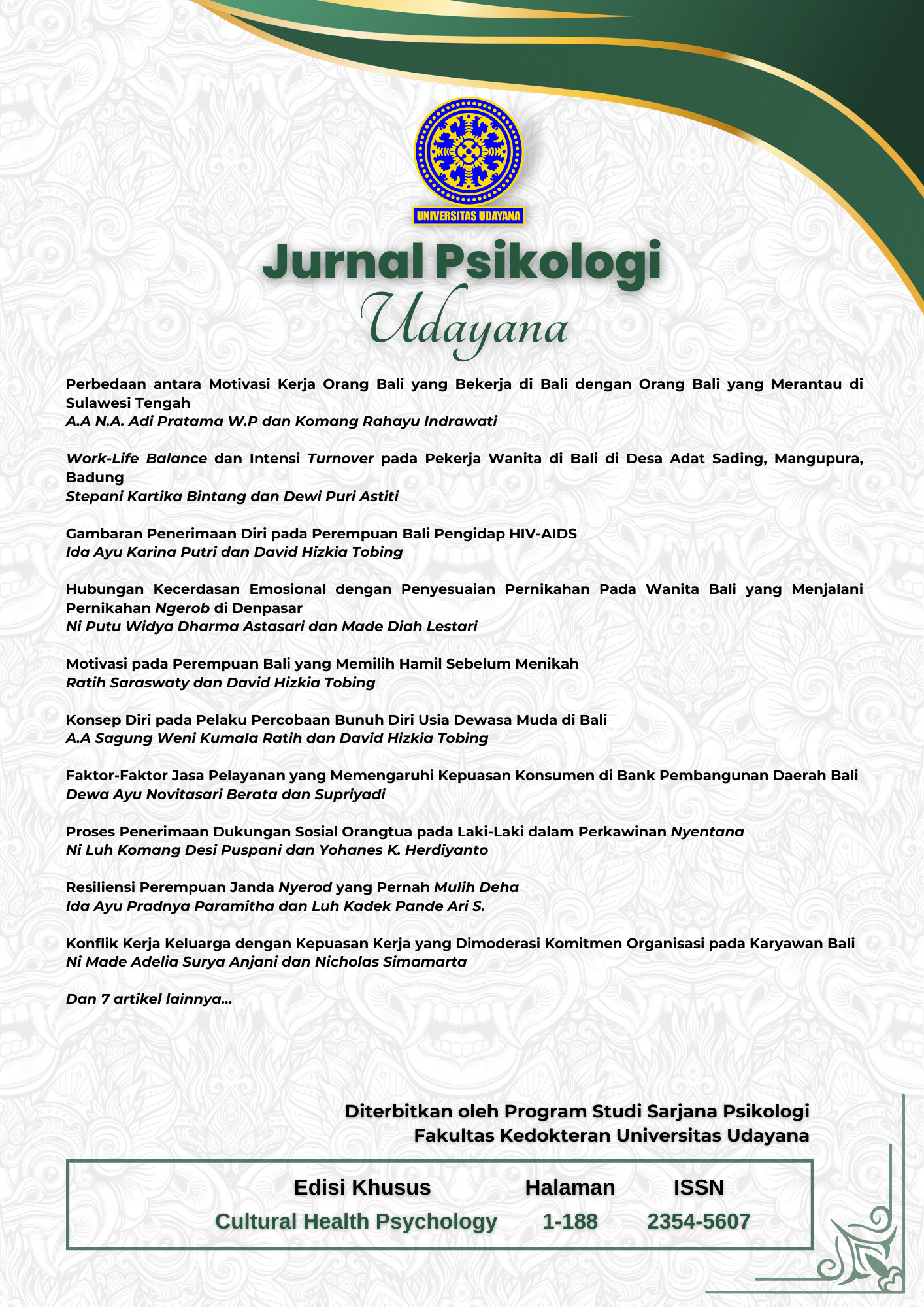PERBEDAAN MOTIVASI KERJA ANTARA ORANG BALI YANG BEKERJA DI BALI DENGAN ORANG BALI YANG MERANTAU DI SULAWESI TENGAH
Abstract
This research aims to find out wheter there is a difference between the work motivation of Balinese whose are working in Bali with Balinese whose migrated in Central Sulawesi.
The research method used was quantitative research approach using comparative study. Primary data obtained from questionnaire drawn up based on work motivation theory of McClelland. Independent variables in this study are the Balinese whose work in Bali and The Balinese whose migrated to Central Sulawesi. The dependent variable is the work motivation. The sampling method used was cluster random sampling. The subject of this research is 90 Balinese whose working in Bali that domiciled in Banjar Benet, Mengwi and 90 Balinese who migrated to Central Sulawesi, who domiciled in South Palu. The criteria of the sample are at least 30 years old, at least have worked for 5 years, and for the Balinese that migrated to Central Sulawesi at least already migrated for 5 years. Research analysis using comparison test with independent sample t-test in SPSS 17.
Result of the data analysis showed that the value P from comparison test is 0.009 so P<0.05, which mean there is difference between the work motivation of Balinese whose working in Bali and Balinese who migrated in Central Sulawesi. Other than that obtained from t value, revealed that the work motivation of Balinese who migrated to Central Sulawesi is higher than the Balinese whose work in Bali.
Keywords: Work Motivation, Balinese, Migrant, MClelland, Comparative studies
Downloads
References
Ayu, R. S. (2011, September 26). Benahi infrastruktur, transmigran sejahtera. Kompas. Retrieved from http://bola.kompas.com/read/2011/09/26/02312817/Benahi.Infrastruktur.Transmigran.Sejahtera
Azwar. S. (2010). Reliabilitas dan Validitas (3rd ed.). Yogyakarta: Pustaka Pelajar Offset
Barker, J. C. (1991). Pacific Island migrants in the United States: Some implications for aging services. Journal of Cross-cultural Gerontology, 6(2), 173-192.
Gobyah, I. K. (2004, Mei 5). Membenahi motivasi kerja. Bali Post. Diambil dari http://www.balipost.co.id/balipostcetak/2004/5/5/b3.htm
Jondra, I. W. (2004). Konflik komunal: Konflik internal etnis bali di kecamatan banjar buleleng.
Kesumaningsari, N. P. A., Natalya, N. P., & Supriyadi, (2012). Contribution of feeling jengah toward balinese adolescent self-achievement.
Kmb27. (2012, Agustus 25). Dikuasai pendatang .krama bali gagal kelola sektor informal. Bali Post. Retrieved from http://www.balipost.co.id/mediadetail.php?module=detailberita&kid=32&id=68726
Latham, G. P. (2007). Work motivation : History, theory, research, practice. California: Sage Publication Inc.
Mangkunegara, A. A., &Prabu, A.(2002). Manajemen Sumber daya manusia untuk bisnis yang kompetitif.
McClelland, D. C., Atkinson, J. W., Clark, R. A., & Lowell, E. L. (1976). The achievement motive.
McClelland, D., & Burnham, D. H. (1989). Power is the great motivator. In H. Levinson (Ed.), Harvard Business Review: Design and Managing Your Carrier (pp. 160-173). Diambil dari http://www.google.co.id/books?hl=id&lr=&id=N1A4rnVMRuAC&oi=fnd&pg=PA160&dq=Need for Power&ots=2D2bozMtr2&sig=oL-E3V81rYCxgc4B4D-B5qWw3f0&redir_esc=y
Munandar, A. S. (2008). Psikologi industri dan organisasi. Jakarta: Penerbit Universitas Indonesia.
Nenomataus, A. I. (2012). Keterkaitan Motivasi Diri dengan Kinerja Perawat dalam Pemberian Asuhan Keperawatan kepada Pasien di Ruang HCU (High Care Unit) (Doctoral dissertation, Program Studi Ilmu Keperawatan FIK-UKSW).
Riyono. (2007). Intergrasi teori motivasi kerja. In U. Mokoginta, B. Sjabadhyni, B. Graito & R. Wutun (Eds.), Dinamika perubahan organisasi dari sistem ke individuJakarta: Bagian Psikologi Industri dan Organisasi Fakultas Psikologi Universitas Indonesia.
Robbins, S. P. (1998). Organizational behavior: Concept, controversies, applications. (8th ed.). New Jersey: Prentince Hal
Robinson, K. (2000). Ketegangan Antarsukubangsa, Orang Bugis, dan Masalah ‘Penjelasan’. Antropologi Indonesia, 63, 45.
Sapila, E. (2013).Pengaruh motivasi kerja, kepemimpinan dan pengembangan karir terhadap kepuasan kerja karyawan pada dinas pendidikan kabupaten pasaman. Jurnal Pendidikan Ekonomi, 2(5).
Super, D. E. (1980). A life-span, life-space approach to career development.Journal of vocational behavior, 16(3), 282-298.
Swarsi, S., Geriya, W., Darmana, K., Puspa, I., & Putri.BA, T. I. Departemen Pendidikan dan Kebudayaan, Direktorat Sejarah dan Nilai Tradisional Bagian Proyek Pengkajian dan Pembinaan Nilai-Nilai Budaya Daerah Bali. (1996).Peranan nilai budaya daerah bali dalam gerakan disiplin nasional. Denpasar: Departemen Pendidikan dan Kebudayaan Direktorat Sejarah dan Nilai Tradisional Bagian Proyek Pengkajian dan Pembinaan Nilai-nilai Budaya Daerah Bali.
Taslim, R. S. A. (2010, Agustus 28). [Web log message]. Diambil dari http://wayanmurdana.blogspot.com/2010/08/kampung-bali-di-parigi-moutong.html
Authors who publish with this journal agree to the following terms:
- Authors retain copyright and grant the journal right of first publication with the work simultaneously licensed under a Creative Commons Attribution-ShareAlike 4.0 International License that allows others to share the work with an acknowledgement of the works authorship and initial publication in this journal.
- Authors are able to enter into separate, additional contractual arrangements for the non-exclusive distribution of the journals published version of the work (e.g., post it to an institutional repository or publish it in a book), with an acknowledgement of its initial publication in this journal.
- Authors are permitted and encouraged to post their work online (e.g., in institutional repositories or on their website) prior to and during the submission process, as it can lead to productive exchanges, as well as earlier and greater citation of published work (See The Effect of Open Access).













